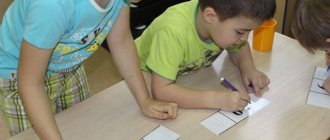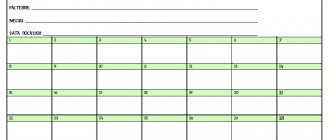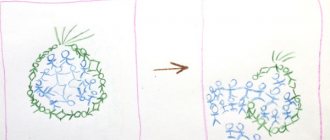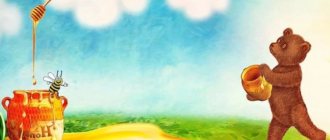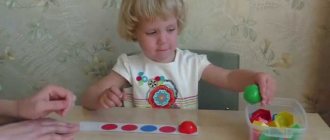How to come up with an amazing name for your children's center?
Having once decided that you want to open your own children's club, you, of course, will not immediately start buying equipment and recruiting a team. You will study the features of this business. And you will also definitely come up with a name for your brainchild. And this is not an easy task! There are already thousands of clubs with beautiful and not so beautiful names.
Using these instructions, you can come up with a great name for your children's center that your customers will like .
Let's first look at what other people call preschool institutions.
Behavior rules
Don’t forget – it’s not enough to create a chat on WhatsApp, you need to learn how to communicate! Let's share important rules of conversation ethics:
- Set a time frame - you can only write during working hours (exclude early morning and late evening);
- Publish only important information – avoid flooding and personal communication;
- Do not enter into conflicts, even if you really want to;
- Do not duplicate questions, do not send several messages in a row;
- Stop using voice and video messages;
- Discuss personal information (about health, absences, behavior) in a private conversation with the teacher.
On topic: ideas for names for family chat.
It’s up to you to decide what to call the group of parents on WhatsApp - with a bit of humor or seriously, imbued with the importance of the moment. In any case, here is a huge selection of titles: something will do!
Most of the titles can be divided into categories:
Based on cartoons and fairy tales:
Teddy, Pinocchio, Totosha, Babayka, Robin Hood, Kapitoshka, Baloo, Umka, Fairy Tale, Teremok, Miracles, FanFan, Chunga-Changa, Goldfish, House of Wizards, Giants, Akuna-Matata, Scientist Cat, Smeshariki, Mumimama, Limpopo, Willie Winky, Little Brownie
Great people:
Pythagoras, Plato, Anderson
Children's names:
Dashenka, Syoma, Zarina, Deniska, Holly, Marie, Sashenka, Marusya, Dara, Monty, Alisa
Animals:
Kangaroo, Owl Owl, Hummingbird, Octopus, Mammoth, Polar Bear, Bee, Dolphin, Firefly, Hedgehogs, Seagull, Canary, Parrot, Ladybug, Toucan, Owl
Plants:
Pine cone, Miracle tree, Grain, Sprout, Birch
Combinations of letters, exclamations and alphabet:
A+B, Z, ABC for parents, Oh yes I am!, Hurray! E+Family, ABC, Az and Buki, Oh!
The science:
Academy, Childhood Academy, Erudite, Electron, Academician baby, Linguist, Logos, Knowledge Workshop, Generic, Parallel, Perspective, Progress, New Century
Childhood:
Smart child, Poznayka, Why, First steps, Freckles, Talker, Empire of childhood, Secret of childhood, Little genius, Myself, Fidget, Smart kid, Know-it-all, Krosha Ru, Childhood time, Ladushki
Family values:
Mom's joy, Lucky one, Miracle of birth, Miracle children, All the best for children, My smart girl, Family circle, Miracle in the house, Trust, Good, Family, 7I, Friendship
Using foreign words:
Okeshka, Babyclub, Players, Mamarada (translit), Atlantis, Sunnyclub, Kinder boom, Mama house, Smile, Bonus Club, New Days, Sound club, Junior, Party-Boom, Bambino, Funny Park, Kinder Party, Leader Land, Bloom , Mini Bambini, Tilly Willy, MySecret, Sprout, Felicita, Kimberly Land, Mark & Maks Club, Infant, Split
Fruits, berries:
Mandarin, Lemon, Vitamin, Citrus, Raspberry, Raspberry, Pomegranate, Orange
Holidays:
Birthday boy, Childhood holiday, Christmas
Creation:
Plasticine, Pencil, Artist, Bead, Paint
Trips:
Safari, In Wonderland, Quarter, Island of Adventure, Land of Fairy Tales, Island, Big Ben, Madagascar, Little America, World of Harmony, Satchel, Athens, Jungle, Children's Town, Space, Sunny City, Talentville, Flower City, Land of Fairy Tales, Malibu
Toys:
Rubik's Cube, Matryoshka, Lala, Pyramid, Cube
Modified words and slang:
Begemontiki, Club-ok, Akvamarinka, Druzyaki, KudoMama, Ukhtyshka, Rhythmusiki, BambiK, MimiMotik, Totoro, Limpik, Fontanevia, Manyanya, TaRaRam, Oika!
Natural phenomena:
Spark, Source, Droplets, Orbit, Sun, Rainbow, Constellation, Whirlwind, Jupiter, Galaxy, Beam, Red Dawns, Atmosphere, Sunrise, Asterisk
How can you come up with something original if there are already so many wonderful titles?
I suggest using the work of artists and designers, namely creative search methods. The main one is the search for associations.
38 definitions for preschool institutions:
With a focus on child development:
Children's Club, Early Development Center, Developmental Center, Educational and Development Center, Institute for the Development of Child Intellect, Development School, Child Development Center, Child Development Center, Intelligence Development Center, Children's Club, Early Development Studio, School of the Future First-Grade, Early Development Groups, English Children's Club, Harmonious Development Club, Training Center, Child Psychology and Development Club, Montessori Center, Children's Educational Center
Family Center, Family Club, Family Development Center, Family Ecology Center, Family Success Club, Family Club, Family Psychological Club, Family Leisure Club, Family Entertainment Center, Center for Children and Parents
What to call a children's club, kindergarten?
UPDATE 7/19/2019 | FIRST PUBLISHED 04/09/2012 126 comments Coming up with a name for your children's center is almost as responsible and sometimes as difficult as giving a name to your child. To be successful, a children's club must surprise. Imagine: a mother walks into a children's club. Let's say it's called "Rainbow". He sees that the chairs are exactly the same as in kindergarten, only newer. The cabinets are from the neighboring furniture store. Toys. Read more
Coming up with a name for your children's center is almost as responsible and sometimes as difficult as giving a name to your child.
To be successful, a children's club must surprise. Imagine: a mother walks into a children's club. Let's say it's called "Rainbow". He sees that the chairs are exactly the same as in kindergarten, only newer. The cabinets are from the neighboring furniture store. Toys from Detsky Mir are opposite.
“What are you doing here with the children?” “We draw, sculpt from plasticine, do exercises,” she answers. “What materials do you use?” - “We work according to this coloring book and this ABC book.”
Do you think mom will pay money for this? I doubt! Why?
Reason #1. Mom will think: “Yes, I can buy a coloring book, an ABC book and plasticine myself. What's so difficult about it? Why would I pay money for this? So, not only can I conduct classes myself, I can open the same club myself.”
Reason #2. The name “Rainbow”, familiar chairs - all this evokes associations with the Soviet past. Mom saw a children’s “circle” in the House of Folk Art or in the House of Culture of the Soviet years. And genetic memory tells my mother: “The Soviet “circle” should be free!”
Hence follows Rule No. 1 of a Successful Children's Club . With all your might you need to “detach yourself” from straightforward Soviet images! Not because Soviet preschool education was bad—it was often very good. But because in people’s minds, Soviet things should be free. Therefore, do not call your club by hackneyed Soviet names: “Ladushki”, “Ladoshki”, “Fairy Tale”, “Spring”, “Firefly”, “Luchik”, “Morozko”, “Rainbow”, etc.
The most successful and modern names of Moscow children's clubs are, in my opinion, “Smiley”, “Mozart-Effect”, “Talentville”. I still think that the name under which my club operated in the first year of its existence was wonderful - “Studio-Pups”. Then we taught very young children, and when we started teaching children from 5 to 9 years old, we had to change the name to a more “adult” one.
The names sound cool and fresh with words borrowed from European languages, such as Baby (Baby Club, Baby Star), Kid (Kid Land, Kid House). Anglicized words sound even more perky when combined with the good old “scoop”.
For example, the children's club "Romashka" makes my cheekbones ache with boredom. “ROMASHKA BABY STUDIO” is much more impressive.
Or give your club a name similar to the Soviet canteen No. 1 - BABY CLUB No. 1. At a minimum, they will be interested in you and want to visit you.
About the author: Zarina Ivanter
Founder of children's and "Classics", author of the books "Children's Club: How to Open and Make it Profitable", "Successful Children's Club. Development plan for 12 months”, “Diary of a happy mother”. Read more about Zarina →
Family clubs as a non-traditional form of interaction
CONTENT
1. Introduction 3
2. Forms of work with parents 3
3. Family club as an opportunity to optimize parent-child relationships of preschoolers 5
4. Conclusion 10
References 11
The changes taking place in the state, society and education place new demands on the nature and quality of relations between the family and the educational institution. In the Law “On Education” (Federal Law dated December 29, 2012 N 273-FZ (as amended on July 23, 2013) “On Education in the Russian Federation”, which entered into force on September 1, 2013 (modified in November 2013)) and the Federal State Educational Standard Preschool education states that parents are the first teachers of their children, and preschool institutions should provide them with assistance in raising their children.
A kindergarten and a family can create a single space for teachers and parents, but only in harmonious complementarity with each other. Recognition of the priority of family education requires a different relationship between the family and the educational institution, namely cooperation, interaction and trust.
Forms of working with parents can be divided into traditional and non-traditional. Traditional ones include such as parent meetings, conferences, corners for parents, holidays, consultations.
Traditional forms of cooperation with families are losing their importance due to their low efficiency and insufficient feedback. This is evidenced by the fact that not all parents trust the level of professional competence of kindergarten teachers, preferring to find the necessary information in other sources (Internet, media, children's development centers, books). Parents' distrust of teachers
raising their child, directly affects children: from year to year, problems in the development of children remain the same - insufficient level of speech development, independence, cognitive activity, motivation for a healthy lifestyle, adequate self-esteem, etc.
Therefore, new, active forms of work with parents are increasingly being used, allowing them to be involved in the process of learning, development and knowledge of their own child.
Non-traditional forms of work: open days, clubs, KVN, quizzes, family competitions, clubs, work exhibitions, newspaper publication, preschool educational institution website, excursions, group registration, garden improvement, competitions.
New, active forms of work with parents are increasingly being used, allowing parents to be involved in the process of learning, development and knowledge of their own child.
Table 1
Non-traditional forms of organizing communication between teachers and parents
| Name | What is the purpose of this form? | Forms of communication |
| Information and analytical | Identification of interests, needs, requests of parents, level of their pedagogical literacy | Conducting sociological surveys, surveys, “Mailbox” |
| Leisure | Establishing emotional contact between teachers, parents, children | Joint leisure activities, holidays, participation of parents and children in exhibitions |
| Cognitive | Familiarization of parents with the age and psychological characteristics of preschool children. Formation of practical skills in raising children in parents | Workshops, pedagogical briefing, pedagogical lounge, meetings, consultations in non-traditional forms, oral pedagogical journals, games with pedagogical content, pedagogical library for parents |
| Visual and informational: informational and educational; awareness-raising | Familiarization of parents with the work of a preschool institution and the features of raising children. Formation of knowledge among parents about the upbringing and development of children | Information brochures for parents, organization of open days (weeks), open viewings of classes and other activities for children. Publishing newspapers, organizing mini-libraries |
Family clubs based in preschool institutions are created with the goal of developing parents’ psychological and pedagogical competence in matters of child-parent relationships and reflection, which allows them to understand their child, competently build communication and joint activities with him. This goal defines the following tasks:
1. Establishing partnerships, common interests, and emotional mutual support between the preschool educational institution and the family.
2. Combining the efforts of preschool employees and parents.
3. Activation and enrichment of parents’ educational skills, supporting their confidence in their own pedagogical capabilities.
4. Providing assistance in resolving conflict situations in the family between parents and children.
The club's programs are based on the developed SEP approaches (Meanings - Emotions - Behavior):
1. Meanings. The family is the source and mediating link in transmitting to the child the socio-historical experience of emotional and business relationships.
2. Emotions. The source of the child’s emotional states is mainly the relationship with the parents. A child can be in a state of emotional comfort (emotionally warm, smooth relationship with parents, constant support), or in a state of emotional discomfort (conflict, anxious relationships). The “foundation” of a preschooler’s emotional experience and worldview is the emotional image of the family. Therefore, the implementation of this approach represented the harmonization of emotional relationships between parents and child.
3. Behavior. The implementation of this approach involved training parents in ways of joint action in all types of activities (cognitive, artistic and aesthetic, labor, household, motor, play, etc.), as well as training parents to interact with children in all areas of their personal development.
The implementation of these approaches allows us to determine three areas of the club’s activities:
1 direction: Expanding parents' knowledge about child-parent relationships and methods of contact with a child, the purpose of which was to increase the cognitive level of parents, i.e. depth of perception of the child; drawing attention to the importance of the problem of interaction and communication with the child and optimizing these relationships.
Non-traditional types of consultations and business games are widely used by teachers in this area.
The consultation - a conference with parents, the main purpose of which was the exchange of experience in family education, proved to be positive.
Parents prepare their messages in advance, the teacher assists in choosing a topic and preparing a speech. At the conference, teachers, specialists and parents model life situations in an entertaining way, acting them out. This enables parents not only to accumulate useful knowledge in the field of raising children, but also to establish trusting relationships with teachers and preschool specialists.
The most convincing are the meetings at which parents who have already experienced difficulties in child-parent relationships share their experiences. In a relaxed conversation, in a cozy atmosphere conducive to frankness, they share their impressions and knowledge.
A successful find is to conduct business games with parents. In the process of working, teachers use various options for classifying these games: research, didactic, reflective-evaluative, motivational.
For example, the use of the “Pedagogical Ring” (research game) allows parents to look at the problem of family education from the point of view of a critic, innovator, conservative. Here one develops the ability to defend one’s opinion in a reasoned manner and the skill of discussion communication.
The consultations and business games used help to achieve independence and creative activity of each parent. They maximize the existing knowledge of the game participants, create a successful emotional climate for their most complete identification, for the exchange of experience.
The “Tree of Revelation” has become a necessary form of work, to which each parent, at a convenient time, makes suggestions, comments on the work, and asks questions of interest. Based on these records, the teacher adjusts his work and draws conclusions about what worries parents.
Thanks to this form of work, the range of topics discussed in club classes expands.
2 direction: Harmonization of emotional relationships between parents and child.
The goal is to increase the emotional level of the relationship between parents and child.
It is expressed in the emotional coloring of the image, in the formation of a positive emotional background in the relationship between parents and children. Increasing the emotionality of parents and mastering ways to express their emotions and feelings towards the child.
The implementation of this direction is carried out by including in classes various methods of increasing the emotionality of children and parents:
- Emotionally expressive games (joint games - imitation, games - dramatization, games - sketches, games - dramatization, role-playing games, etc.); touch and finger games; communicative games of verbal and non-verbal orientation; speech, facial expression, musical and rhythmic warm-ups; the use of emotional and symbolic methods; holidays, entertainment; psychomuscular training, etc.
Role-playing games. At club classes, parents master role-playing gymnastics together with their children (for example, smile like a joyful child, get tired like a dad after work, etc.), learn to include different timbres and voice intonations in role-playing actions (for example, pronounce a phrase with different emotional shade - “I asked you not to come near me,” etc.). Children and parents portray roles using facial expressions and gestures, poses and movements.
For example, in the game “Child is a mirror of the family”, where participants “disassemble” the usual roles: the child is “dad”, and the adult is “child” and play out various interaction situations.
Games are simulations. The purpose of the games is to enrich them with emotions arising from sensations associated with movements, gestures, postures, from experiencing the state and conditions in which a child and an adult find themselves.
The used touch and finger games, in addition to fulfilling their main task, activate the mechanisms of emotional response.
With the help of communicative games, the general abilities of verbal and non-verbal influence of parents and children on each other (emotional manifestations and pantomime contacts) are trained.
Children and parents really like mimic and pantomime sketches, in which it is necessary to expressively depict the character’s character, mood, feelings, and individual emotional states (joy, anger, surprise, interest, etc.) associated with the experience of bodily and emotional influence.
Based on the principles of the concept of a personality-oriented model for building a developmental environment, together with parents they organize: a “mood corner” and a “solitude corner”, where photographs, piggy banks, favorite things of families, photo albums made together with parents, and games are stored; areas for playing with water and sand.
3 direction: Harmonization of methods and methods of parental behavior in order to increase the behavioral level, optimize child-parent relationships, harmonize methods and methods of behavior of parents, teaching optimal ways to interact with a child. To this end, at club classes, parents are taught to be listeners when communicating with their children, to structure their behavior in such a way that this contributes to their full development, to include them in all types of joint activities, accepting them as they are.
In this direction, such practical forms of work as:
· Solving pedagogical problems in order to improve parents’ reflection of their relationship with the child, developing constructive skills of interaction with the child.
· Exercises to develop verbal and non-verbal interaction.
· Role-playing family situations allows parents to develop the ability to play certain roles and provide pedagogically correct assistance to the child in a problem situation. In them, parents, together with an educational psychologist, learn to understand the child’s behavioral reactions, evaluate and calculate behavior, including their own, considering it as a set of reactions - stimuli from the external environment, forming social skills of behavior, i.e. resolve problems that arise in interactions between parents and children.
· joint activities of parents and children, during which a series of didactic games aimed at social development are created. Thanks to this, parents develop socially significant interests, a need to obtain new information, and partnerships with children arise.
An interesting and entertaining form of cooperation between teachers, parents and children is the organization of club leisure activities.
The topics of events can be different and include various areas, for example: “Family Traditions”, “My Birthday”, “Kindergarten Birthday”, etc.
Holidays are a special, favorite part of general life, where parents are full participants in such actions - from idea to implementation.
This approach helps creative cooperation between parents and children, eliminates alienation, instills confidence, and solves many problems of family education.
Without duplicating the functions, structure and tasks of such traditional forms of work with families as parent meetings, parent lectures, the Club should stimulate parents’ desire for self-knowledge, awaken interest in the child’s personality, and the desire to provide him with help and support. Parents and teachers in this complex process must act as like-minded people, partners, and friends. A family club is a promising form of working with parents, taking into account the current needs of families and contributing to the formation of an active life position of participants in the process, strengthening the institution of the family, and transferring experience in raising children.
1. Antipina, G. A. New forms of work with parents in a modern preschool educational institution // Preschool teacher. - 2011. - No. 12. – P.88 – 94.
2. Arnautova E.P. We are planning to work with our family. // Management of preschool educational institutions. - 2006.- No. 4. – P. 66 – 70
3. Davydova O.I. A competency-based approach in the work of a preschool educational institution with parents. – St. Petersburg: PUBLISHING HOUSE CHILDREN’S PRESS, 2013. – 128 p.
4. Zvereva O.L. Methodological assistance to educators in preparing to communicate with parents // Preschool Education Management. 2012. No. 4. p.100-110.
5. Kozlova A.V., Desheulina R.P. Work of preschool educational institution with family. M., 2010. – 117 p.
6. Kotova E.V. Study of the characteristics of parent-child relationships. - Krasnoyarsk, 2013.
7. Osipova L.E. Working in a kindergarten with a family. – Ed. , 2011. – 72s.
8. Practical psychology for teachers and parents / ed. M.K. Tutushkina. – St. Petersburg: Didactics Plus, 2010. – 351 p.
9. Tonkova, Yu.M. Modern forms of interaction between preschool educational institutions and families. // Problems and prospects for the development of education: materials of international. in absentia conference - Perm: Mercury, 2012. – P. 71 – 74.
10. Khasnutdinova, S.R. Search for active forms of interaction between kindergarten and parents. // Preschool teacher. — 2011. -№11. – P. 82 – 97.


